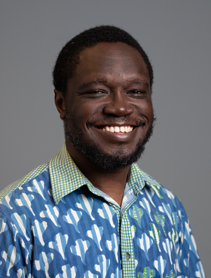
Dr. Kwame Owusu-Daaku
- Position: Associate Professor
- Department: Earth and Environmental Sciences
- Office Location: Building 13, Room 317
- kowusudaaku@uwf.edu
- Campus: 850.474.3314
Biography
Kwame N. Owusu-Daaku, an Associate Professor, is a qualitative researcher with interests in human geography, urban planning, and international development. He teaches courses related to human geography, environmental management and planning, and sustainability and is also interested in community engagement, and civic scholarship. His current research interests include community resilience, brownfield redevelopment, international development, STEM education, and the social aspects of biophysical science.
Kwame has been awarded external funding from the Robert Noyce Teacher Scholarship Program of the National Science Foundation, and the Gulf Research Program of the National Academies of Sciences, Engineering, and Medicine.
Degrees & Institutions
Ph.D. Geography, University of South Carolina, 2017
MS Urban and Regional Planning, University of Iowa, 2013
BSc Development Planning, Kwame Nkrumah University of Science and Technology, 2009
Research
His research focuses on the impacts of environmental change and pollution on stakeholders of coastal and inland coastal communities and the efforts of these stakeholders to build resilience to these impacts. Specifically, he is interested in how environmental change and brownfield redevelopment influence the practice of planning in both rural and urban settings, locally and internationally. The goal of his research program is to pair this focus on impacts with strategies such as STEM education through citizen science to build awareness of -- and inspire action to improve – environmental problems.
His international research has examined sea defense systems in the Volta River Delta of Ghana from the perspectives of multiple stakeholders and how such projects responded to (or failed to respond to) the needs of the populations for which these projects were intended. He has also worked on environmental projects in Ghana, Mali and Malawi. Locally, he has collaborated on community engagement projects with the Environmental Protection Agency - Region IV on brownfields redevelopment and/or disaster recovery projects in the Florida counties of Escambia, Calhoun, and Gulf.
Current Courses
- Urban Planning (Fall)
- Environmental Management and Planning (Spring)
- Environmental Science, Politics, and Policy (Fall)
- Honors: Systems Thinking and Interdisciplinary Research (Fall)
- Environment and Economy (Spring)
- Environmental Writing (Summer)
- Environment and (International) Development (Directed Study-any semester)
Classes Taught
- Seminar in Environmental Issues
Special Interests
Improving instruction and mentoring, planning and public education, STEM education, socio-environmental change and justice, social theory, ethnography, science communication, transdisciplinary research, Peace Corps, coastal protection infrastructure, deltaic environments
Publications
Peer-reviewed journal articles
Owusu-Daaku K.N. (2020) Engaging students in planning for superfund site remediation and redevelopment. Journal of Environmental Management Volume 278, Part 2, 15 January 2021, 111567 https://doi.org/10.1016/j.jenvman.2020.111567
Owusu-Daaku K.N., Rosko, H. (2019) The Discursive Construction of Adaptation Subjects via the Ada Sea Defense System in the Volta River Delta of Ghana. Environment and Planning E: Nature and Space https://doi.org/10.1177/2514848619846087
Owusu-Daaku K.N. and Onzere S.N. (2019) The Application of Ethnography in Agricultural Research: A tool for diagnosing problems and sustaining solutions. African Journal of Food, Agriculture, Nutrition and Development 19(1): 14090-14112
Peer-reviewed chapter in edited volume
Owusu-Daaku K.N., Devine, M. (2023) Factors Influencing Considerations for Urban Planning as a Field of Study and/or Career Choice Among Environmental Science Students in Diko, S., Hollstein, L., Pallazzo, D., [eds] The Routledge Companion to Professional Awareness and Diversity in Planning Education. Routledge
Owusu-Daaku K.N. (2021) Rationalities of Government and Webs of Relations(hips) in the Funding and Implementation of Sea Defense Systems in the Volta River Delta of Ghana in McCusker, B., Ahmed, W., Ramutsindela, M., Solis, P. [eds] The Routledge Handbook of Development and Environment. Routledge
Keywords: community resilience, land revitalization planning, political ecology, international development, qualitative research, Ghana






